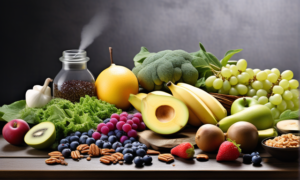 Debunking the Myth: Does High-Fiber Food Lead to Weight Gain? Insights from Nutritionists
Introduction:
There's a common misconception that consuming high-fiber foods can lead to weight gain, but the reality is quite the opposite. While fiber may not be the most glamorous nutrient, its significance in maintaining overall health cannot be overstated. Abundant in plant-based foods, dietary fiber is an indigestible carbohydrate that aids in maintaining a healthy digestive system, transporting LDL cholesterol away from the heart, promoting satiety, and regulating blood sugar levels. According to the Centers for Disease Control and Prevention (CDC), a fiber-rich diet is linked to reduced risks of heart disease, diabetes, and certain types of cancers.
For optimal health, it's encouraged to increase the intake of fiber-rich foods such as fruits, vegetables, nuts, seeds, legumes, and whole grains. However, does consuming fiber contribute to weight loss, or can overconsumption lead to weight gain?
This article will explore how fiber facilitates weight loss, why some may perceive it as a weight-gaining factor, the role of fiber supplements, and 10 simple ways to increase fiber intake.
Why Fiber Promotes Healthy Weight Loss:
Despite the numerous health benefits of fiber, the majority of Americans, as per the 2020-2025 Dietary Guidelines, fall short of the recommended daily fiber intake (25 to 34 grams). In addition to promoting heart health and a well-functioning digestive system, fiber has been proven to support healthy weight loss through various potential mechanisms.
Increased Satiety:Fiber induces a sense of fullness, requiring longer chewing time, stimulating saliva and gastric acid production, and slowing down stomach emptying. Prolonged satiety may lead to reduced overall calorie intake, creating a calorie deficit and resulting in weight loss. Research suggests that the impact of fiber on satiety depends on factors such as fiber quantity, molecular size, solubility, and the food matrix.
Supports Diet Adherence:In a 2019 study published in the Nutrition Journal, researchers found that dietary fiber intake, unrelated to nutrient and calorie intake, facilitated weight loss and adherence to diet restrictions in adults struggling with overweight or obesity.
Improves Gut Microbiota:Certain types of dietary fiber, known as prebiotics, can increase the presence of beneficial bacteria like bifidobacteria and lactobacilli in the gut. Diverse and healthy gut microbiota is associated with weight loss and reduced obesity risk, as highlighted in a 2017 review in Translational Medicine and a 2018 review in Genes.
Blood Sugar Regulation:Fiber plays a crucial role in slowing down the metabolism of glucose from carbohydrates, leading to a gradual and steady postprandial blood sugar response. This stable response is linked to increased satiety.
Why You Might Think Fiber Causes Weight Gain:
A sudden or significant increase in fiber intake, especially without sufficient water consumption, can lead to bloating, abdominal distension, and constipation. When your stomach feels bloated or your bowel movements are irregular, you might perceive a temporary weight gain due to fecal support affecting scale readings. However, sustained weight gain requires consuming more calories than your body needs.
Are Fiber Supplements Beneficial for Weight Loss?
While fiber supplements may contribute to increased fiber intake, they do not address other behavioral factors influencing weight, such as stress, sleep, physical activity, and dietary choices. Fiber supplements lack the diverse nutritional components present in whole foods, emphasizing the importance of a food-first approach for weight management. Additionally, the effectiveness of fiber supplements may vary among individuals.
10 Simple Ways to Increase Fiber Intake:
As per the Dietary Guidelines, adult women are recommended to consume 25 to 28 grams of fiber daily, while adult men should aim for 31 to 34 grams. For those not accustomed to consuming fiber-rich foods, gradually increasing intake while ensuring adequate water intake can minimize bloating and prevent constipation, nausea, and dehydration. Here are 10 practical ways to boost daily fiber consumption:
Start your day with a fiber-rich breakfast, such as vegetable omelets with whole-grain bread, low-fat yogurt with fruits and nuts, a fruit or vegetable high-protein smoothie, or fiber-rich overnight oats.
Add one serving of fruit or vegetables to each meal, aiming for 1.5 to 2 cups of fruit and 2 to 3 cups of vegetables daily for adults.
Consume fruit and vegetable skins, such as apples, pears, and potatoes.
Include one serving of berries in your daily diet; one cup of raspberries, for example, contains 8 grams of fiber.
Eat one serving (1 to 1.5 ounces) of nuts daily, which provide fiber and omega-3 fatty acids crucial for heart, eye, brain, and skin health.
Practice the USDA's MyPlate method, filling half your plate with non-starchy vegetables, one-quarter with protein sources (fish, chicken, turkey, lean beef, tofu), and the remaining quarter with starchy protein sources (whole grains or starchy vegetables like sweet potatoes, potatoes, pumpkin, or butternut squash).
Add a tablespoon of fiber-rich seeds to snacks, such as chia seeds, flaxseed powder, hemp seeds, or pumpkin seeds, in yogurt, cheese, oats, or non-dairy yogurt alternatives.
Choose whole grains for half of your grains, including whole-grain bread, whole wheat, oats, popcorn, corn, farro, freekeh, quinoa, barley, brown rice, wild rice, and teff.
Include half a cup of legumes in your daily routine; for example, mix chopped vegetables with hummus or chickpea puree. Half a cup of beans contains at least 5 grams of fiber.
Consume avocados in various forms, such as in top-tier sandwiches, vegetable bowls, wraps, or whole-grain crackers. According to USDA data, half a medium-sized avocado contains around 6 grams of fiber.
In conclusion, rather than causing weight gain, a well-rounded diet rich in fiber can significantly contribute to healthy weight loss and overall well-being. The key is to adopt a balanced and sustainable approach to dietary choices, embracing a variety of nutrient-dense foods.
Debunking the Myth: Does High-Fiber Food Lead to Weight Gain? Insights from Nutritionists
Introduction:
There's a common misconception that consuming high-fiber foods can lead to weight gain, but the reality is quite the opposite. While fiber may not be the most glamorous nutrient, its significance in maintaining overall health cannot be overstated. Abundant in plant-based foods, dietary fiber is an indigestible carbohydrate that aids in maintaining a healthy digestive system, transporting LDL cholesterol away from the heart, promoting satiety, and regulating blood sugar levels. According to the Centers for Disease Control and Prevention (CDC), a fiber-rich diet is linked to reduced risks of heart disease, diabetes, and certain types of cancers.
For optimal health, it's encouraged to increase the intake of fiber-rich foods such as fruits, vegetables, nuts, seeds, legumes, and whole grains. However, does consuming fiber contribute to weight loss, or can overconsumption lead to weight gain?
This article will explore how fiber facilitates weight loss, why some may perceive it as a weight-gaining factor, the role of fiber supplements, and 10 simple ways to increase fiber intake.
Why Fiber Promotes Healthy Weight Loss:
Despite the numerous health benefits of fiber, the majority of Americans, as per the 2020-2025 Dietary Guidelines, fall short of the recommended daily fiber intake (25 to 34 grams). In addition to promoting heart health and a well-functioning digestive system, fiber has been proven to support healthy weight loss through various potential mechanisms.
Increased Satiety:Fiber induces a sense of fullness, requiring longer chewing time, stimulating saliva and gastric acid production, and slowing down stomach emptying. Prolonged satiety may lead to reduced overall calorie intake, creating a calorie deficit and resulting in weight loss. Research suggests that the impact of fiber on satiety depends on factors such as fiber quantity, molecular size, solubility, and the food matrix.
Supports Diet Adherence:In a 2019 study published in the Nutrition Journal, researchers found that dietary fiber intake, unrelated to nutrient and calorie intake, facilitated weight loss and adherence to diet restrictions in adults struggling with overweight or obesity.
Improves Gut Microbiota:Certain types of dietary fiber, known as prebiotics, can increase the presence of beneficial bacteria like bifidobacteria and lactobacilli in the gut. Diverse and healthy gut microbiota is associated with weight loss and reduced obesity risk, as highlighted in a 2017 review in Translational Medicine and a 2018 review in Genes.
Blood Sugar Regulation:Fiber plays a crucial role in slowing down the metabolism of glucose from carbohydrates, leading to a gradual and steady postprandial blood sugar response. This stable response is linked to increased satiety.
Why You Might Think Fiber Causes Weight Gain:
A sudden or significant increase in fiber intake, especially without sufficient water consumption, can lead to bloating, abdominal distension, and constipation. When your stomach feels bloated or your bowel movements are irregular, you might perceive a temporary weight gain due to fecal support affecting scale readings. However, sustained weight gain requires consuming more calories than your body needs.
Are Fiber Supplements Beneficial for Weight Loss?
While fiber supplements may contribute to increased fiber intake, they do not address other behavioral factors influencing weight, such as stress, sleep, physical activity, and dietary choices. Fiber supplements lack the diverse nutritional components present in whole foods, emphasizing the importance of a food-first approach for weight management. Additionally, the effectiveness of fiber supplements may vary among individuals.
10 Simple Ways to Increase Fiber Intake:
As per the Dietary Guidelines, adult women are recommended to consume 25 to 28 grams of fiber daily, while adult men should aim for 31 to 34 grams. For those not accustomed to consuming fiber-rich foods, gradually increasing intake while ensuring adequate water intake can minimize bloating and prevent constipation, nausea, and dehydration. Here are 10 practical ways to boost daily fiber consumption:
Start your day with a fiber-rich breakfast, such as vegetable omelets with whole-grain bread, low-fat yogurt with fruits and nuts, a fruit or vegetable high-protein smoothie, or fiber-rich overnight oats.
Add one serving of fruit or vegetables to each meal, aiming for 1.5 to 2 cups of fruit and 2 to 3 cups of vegetables daily for adults.
Consume fruit and vegetable skins, such as apples, pears, and potatoes.
Include one serving of berries in your daily diet; one cup of raspberries, for example, contains 8 grams of fiber.
Eat one serving (1 to 1.5 ounces) of nuts daily, which provide fiber and omega-3 fatty acids crucial for heart, eye, brain, and skin health.
Practice the USDA's MyPlate method, filling half your plate with non-starchy vegetables, one-quarter with protein sources (fish, chicken, turkey, lean beef, tofu), and the remaining quarter with starchy protein sources (whole grains or starchy vegetables like sweet potatoes, potatoes, pumpkin, or butternut squash).
Add a tablespoon of fiber-rich seeds to snacks, such as chia seeds, flaxseed powder, hemp seeds, or pumpkin seeds, in yogurt, cheese, oats, or non-dairy yogurt alternatives.
Choose whole grains for half of your grains, including whole-grain bread, whole wheat, oats, popcorn, corn, farro, freekeh, quinoa, barley, brown rice, wild rice, and teff.
Include half a cup of legumes in your daily routine; for example, mix chopped vegetables with hummus or chickpea puree. Half a cup of beans contains at least 5 grams of fiber.
Consume avocados in various forms, such as in top-tier sandwiches, vegetable bowls, wraps, or whole-grain crackers. According to USDA data, half a medium-sized avocado contains around 6 grams of fiber.
In conclusion, rather than causing weight gain, a well-rounded diet rich in fiber can significantly contribute to healthy weight loss and overall well-being. The key is to adopt a balanced and sustainable approach to dietary choices, embracing a variety of nutrient-dense foods.
Classics Games
Hot Recipes
Latest Lists
 Low-Calorie Mango-Almond Smoothie Bowl
Low-Calorie Mango-Almond Smoothie Bowl
 Low-Calorie Huevos Rancheros Tacos
Low-Calorie Huevos Rancheros Tacos
 Low-Calorie Strawberry-Banana Protein Smoothie
Show All
Low-Calorie Strawberry-Banana Protein Smoothie
Show All
 Lemon-Garlic Shrimp with Sautéed Broccoli
Lemon-Garlic Shrimp with Sautéed Broccoli
 Honey-Glazed Roasted Golden Beets with Thyme
Honey-Glazed Roasted Golden Beets with Thyme
 Sesame-Ginger Cabbage Stir-Fry
Show All
Sesame-Ginger Cabbage Stir-Fry
Show All

 Follow
Follow



